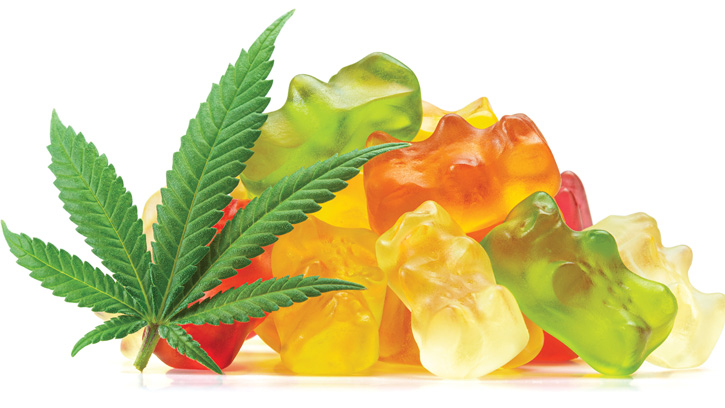Consumers, COVID-19, and CBD Edibles
CONSUMER TRENDS
The pandemic continues to accelerate consumer pressure to bring legal cannabis-derived products, including cannabidiol (CBD)-containing foods, beverages, supplements, and pet treats, to market. Judging from current market activity, if and when the U.S. Food and Drug Administra-tion (FDA) issues CBD regulations, it will have been well worth the wait—for marketers of edibles in particular.
CBD is a non-psychoactive cannabinoid derived from the herbal flowering plant family, Cannabis sativa, which includes hemp and marijuana. Delta-9-tetrahydrocannabinol (THC) is the compound in cannabis that produces a high.
Seven in 10 consumers believe that CBD offers health benefits: pain management (43%), reduced anxiety (39%), relaxation (33%), and reduced inflammation (27%), according to the Natural Marketing Institute’s 2020 Whole Cannabis Study.
The Regulatory Landscape
The FDA continues to hold that it is illegal to add CBD to foods or to label it as a dietary supplement. Although the 2018 Farm Bill enabled hemp-derived products containing less than 0.3% THC on a dry weight basis to be removed from the illegal drug Controlled Substances List, the FDA does not recognize CBD as GRAS (Generally Recognized as Safe) or as a legal food additive. Compounding FDA’s regulatory conundrum is the fact that CBD was first approved as a drug, which prohibits its use in foods under the Food, Drug and Cosmetic Act.
The FDA is continuing to evaluate the long-term safety of CBD (with less than 0.3% THC) and the cumulative effect of consuming a variety of foods that contain CBD. In 2019, the FDA held hearings, conducted an industry workshop, and established a working group within the FDA on CBD. It has sent warning letters only to those making egregious health claims and has funded a multi-year nationwide CBD product review. CBD with THC levels of less than 0.3% has been approved by the FDA for use in cosmetics. Ironically, nearly one-third of consumers mistakenly think the FDA permits the sales of CBD edibles, per Mintel’s 2020 report Consumer Interest in CBD Food and Drink—U.S.
Although 15 states have legalized recreational marijuana and more than 30 have legalized medical marijuana, per information from New Frontier Data, cannabis products, including edibles sold through dispensaries, are illegal at the federal level. Five states had cannabis legalization initiatives on 2020 election ballots, and the initiatives passed in all five states.
Breaking Down the Market
About one in five U.S. adults (16%) has purchased a CBD product, per New Frontier Data’s 2020 U.S. Consumer CBD Study. That includes 23% of those aged 18–34, 21% of 35–54-year-olds, and 14% of those aged 55 and older.
Three-quarters (76%) of cannabis users use CBD. Of cannabis product users, 21% use CBD only, 24% use marijuana only, and 55% use both, per IRI’s and BDS Analytics’ 2020 “The Cannabis Opportunity: Unders-tanding Consumer Behavior” webinar. Among CBD users, 48% use hemp-derived CBD only, 24% use marijuana-derived CBD only, and 28% use both.
In 2019, CBD was the top-selling herbal supplement in the natural channel and was ninth in mainstream multi-outlets, per SPINS. Sales of hemp-based CBD supplements reached $623 million in 2019, per Nutrition Business Journal.
According to the 2020 CRN Consumer Survey on Dietary Supplements, 4% of dietary supplement users take a CBD supplement; that includes 6% of those between the ages of 18 and 54 and 1% of those aged 55 and older. Eight percent have increased their use of CBD supplements since the advent of the COVID-19 pandemic.
One-third of convenience store shoppers have tried CBD edibles, and four in 10 would like to, per Technomic’s Q4 2020 C-store MarketBrief. CBD-infused cold dispenser beverages, baked goods, and snacks/appetizers are the items convenience store consumers say they would most like to try. For the year ended Oct. 4, 2020, CBD/hemp product sales in convenience stores reached $110 million, per IRI.
Shopping for CBD
In 2019, dispensaries dominated CBD product sales, accounting for 51% of sales, followed by e-commerce (14%), pharmacies (14%), natural/vitamin stores (5%), grocery stores (4%), convenience stores (4%), drug stores (3%), and mass merchandisers (1%), per BDS Analytics. CVS, Walgreens, Kroger, and Albertsons are among the national chains selling CBD products. Price is the most important purchase influencer, followed by the amount of CBD per serving, according to New Frontier Data.
Edibles (food, candy, and beverages) are projected to be the fastest-growing category of CBD-containing consumer products sold in mainstream retail outlets by 2024, adding $5.7 billion in revenue by that year, per IRI/BDS Analytics. The total mainstream CBD market, which includes edibles and other products ranging from topicals to pet care products, is expected to grow from $3 billion in 2019 to $18 billion in 2024. During the early days of the pandemic (from April 14 to June 14), sales of CBD-infused foods and beverages shot up by 39%, per IRI.
From January through June 2020, edible sales in dispensaries totaled $420 million or 15% of dispensary sales, per BDS Analytics. Seven in 10 cannabis consumers use edibles; one-third prefer them. Candy accounted for more than half of edible sales in dispensaries in the first quarter of 2020; chocolate, baked goods, other infused foods, pills, and beverages were also on the list of top-selling edible product categories.
Beverages accounted for only 6% of edible sales in dispensaries, per BDS Analytics, but they were the fastest growing. In retail channels, the CBD beverage category had more new product introductions than any other nonalcoholic drink category in the first quarter of 2020, according to Beverage Marketing Corporation.
One in 10 dog and cat owners bought CBD pet products last year, most often for comfort/pain relief, anxiety control, or general wellness, per Packaged Facts’ U.S. Pet Market Outlook 2020–2021 report. The Brightfield Group reports that sales of CBD-infused pet product reached $321 million in 2019.
CBD on the Menu
CBD is making its way into the foodservice sector as well. Snacks and sweets made with CBD topped dessert trends cited by chefs in the National Restaurant Association’s What’s Hot 2020 Culinary Forecast. CDB dishes and drinks ranked third among up-and-coming menu innovations.
In October 2020, CBD-containing foods and drinks appeared on 1.8% of fine dining menus and 0.9% of menus overall, per Datassential Menu-Trends. According to Datassential tracking, most of the increases on menus occurred in 2019 and 2020. Cocktails, nonalcoholic beverages, and comfort foods were the most popular CBD menu offerings, per Datassential.
Half of diners are interested in trying new CBD menu items, Datassential notes. A limited-time offering of a Rocky Mountain High Cheese Burger Delight with CBD extract in the Santa Fe sauce from Carl’s Jr. enjoyed high acceptance for “uniqueness” and “draw,” according to Datassential.
Risks and Realities
For those interested in eventually marketing CBD edibles, there is still a lot of work to be done. More than half of consumers don’t understand the differences between CBD and THC or the difference between hemp and marijuana, according to Mintel research. IRI reports that six in 10 incorrectly believe that hemp products will have a psychoactive effect.
And safety is an issue. While many consumers are interested in the potential health benefits of CBD, only about four in 10 consumers under age 55 and 29% of those aged 55 and older think CBD edibles are safe, Mintel reports. A 2019 report titled The CBD Effect from sales and marketing agency Acosta noted that among those unwilling to try CBD products last year, 29% attributed it to insufficient clinical research; a similar number cited their distrust of current claims.
The support of medical professionals will be important for the market success of CBD edibles. Dosing, serving size, and flavor are critical formulation issues, as well as ensuring the safety and quality of the supply chain.
Lastly, with more than two dozen cannabinoids, including CBG, CBX, and CBN, already being featured on product packages in dispensaries, savvy marketers should use the period prior to regulatory approval to investigate ways to differentiate CBD ingredients.




